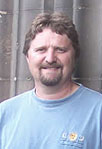Chris Ransick: The Flash of Poetry and the Formation of Fiction
 (Chris Ransick’s novel, A Return to Emptiness, won the 2005 Colorado Authors League Award for Fiction, and his volume of poetry, Never Summer: Poems from Thin Air, the 2003 Colorado Book Award, both from Ghost Road Press. He is currently the Poet Laureate of Denver.)
(Chris Ransick’s novel, A Return to Emptiness, won the 2005 Colorado Authors League Award for Fiction, and his volume of poetry, Never Summer: Poems from Thin Air, the 2003 Colorado Book Award, both from Ghost Road Press. He is currently the Poet Laureate of Denver.)
(1) I use the largest of frames for my writing life. In other words, I approach every day as holding potential material for poems, stories, or essays and I’m willing to move between genres as the current takes me. I think of writers like Margaret Atwood, whom I admire tremendously—and there are a handful of others like her who write proficiently in all these genres. That’s the kind of writing life I am trying to cultivate.
I will say that writing a poem is a response to a moment—at least it is for me. I have done more complex projects in poetry, where I’m working on a very long sequence of poems, and that feels more like fiction writing. For the most part, poems come in smaller packages and so I find myself working in this vein more frequently.
(2) and (4) I’ll answer both of these questions together, since they seem related. Fiction sets up in me slowly, like a stalactite forming on the roof of a cavern. Ideas aggregate over time; the genesis is usually a character who occupies my imagination and then the plot and setting build around this figure until I’m ready to put a draft on paper.
Conversely, poetry comes in flashes–the exact opposite of how stories arrive. I don’t put off a poem when it arrives, I get right down to it and write it before the moment passes. It turns out that for years now, I get these flashes outside, when I’m in the sun, rain, wind. Poetry arrives through my senses—through phenomena (sensation; the body), not noumena (thought, the source of my fiction).
If I were to turn to essay/nonfiction, I’d say that is more deliberate than either of the others: I don’t wait for inspiration, I decide what my subject is, I go to the smithy, and I hammer the thing out like a good wordsmith should, as I am doing right now in answering these questions.
(3) The obvious answer is yes, there is a relationship, a similarity between my prose and poetry. It’s water from the same well. However, the element of point-of-view has huge implications in fiction. All stories are told by narrators; only some poems are rendered this way, as in the dramatic monologue, and for me, it’s a rare device. Meanwhile, the personal essay presents the implied self as narrator, so that’s yet another layer.
What unites all these things is a certain diction. We can’t help but draw from our personal word hoard and that means elements of a common voice are going to carry throughout it all. I also rely heavily—very heavily—on imagery in fiction, and that’s my poetic training coming through.
Finally, it’s probably easier for someone other than the writer himself to make a judgment on this all based on the way the material is striking the reader. I mentioned Atwood earlier. Her prose style is clean and intense; she can describe things in brutal clarity through narrators that are steely and controlled in voice. If you look at her poetry, you find compressed versions of this voice—so sharp you don’t even feel the knife going in.
(5) Poetry requires an ear so finely tuned to musicality in language that I don’t think it can be gotten without a lot of sweat and effort. It can also be lost, I think, without consistent nurturing. There are also so many blind alleys in poetry, so many self-indulgences that can wreck you that it’s difficult to stay on course. I’m still learning all this. I will be learning it on the morning of my last day. If that ain’t glorious, what is?
As for fiction, I don’t get a sense of the glorious at any time during the writing process except at the end of it. I see fiction as work, hard work, like plowing a rocky field. It takes a resilience, almost a mania, to complete a novel, and short fiction has elements of that as well. Many writers, even most, plow half the field and give up. It’s hard to plow all the way. It’s hard to put the seed down and wait for it to sprout, but when it does—when that first green pushes up from the soil, you might feel slight glory before you collapse from exhaustion.

